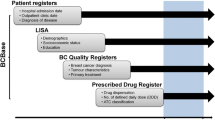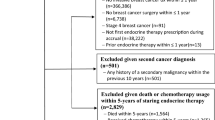Abstract
Purpose
Adjuvant endocrine therapy (AET) for ≥ 5 years is generally recommended for women with hormone receptor-positive breast cancer to reduce cancer recurrence/mortality; however, adherence can be suboptimal. We tested determinants of AET adherence using patient characteristics, treatment pathways, AET initiation timing, and multiple healthcare facility use. An underlying objective was to explore how oncological pathways mirror chronic disease management to monitor adherence and target improvement interventions using administrative datasets.
Methods
Using patient-linked administrative health data from the Italian Lombardy Region, we identified 33.291 surviving patients starting AET in 2010–2016, with two (22.939 patients) or five years (8400 patients) follow-up, using a ≥ 80% prescription refill approach to measure adherence and logistic regression to test determinants of adherence.
Results
AET crude adherence falls significantly during follow-up, from 94% at 1 Year to 58% at 5 Years. At 5 Years, patients who were older (>70), prescribed tamoxifen-only (OR 0.69; 95% CI 0.57–0.83; p = 0.0001) vs. aromatase inhibitors-only or therapy switches, treated for depression (OR 0.68; 95% CI 0.60–0.78; p < 0.0001), with surgery performed in high-volume hospitals (OR 0.85; 95% CI 0.75–0.97; p = 0.0116) showed lower adherence. Loyalty, or continued care in the surgical hospital (OR 1.73; 95% CI 1.51–2.00; p < 0.0001), undergoing chemotherapy before AET (OR 2.65; 95% CI 2.02–3.48; p < 0.0001), and earlier AET initiation, positively influenced adherence.
Conclusions
Chronic disease monitoring using administrative data can help oncologists focus efforts to ensure AET adherence. Results suggest addressing mental health, age, disease severity patient perceptions, timely AET initiation and therapy switches, and encouraging continued follow-up in the same hospital or better care coordination with outside follow-up specialists.

Similar content being viewed by others
Abbreviations
- AET:
-
Adjuvant endocrine therapy
- AIs:
-
Aromatase inhibitors
- BDA:
-
Banca Dati Assistito
- DRG:
-
Diagnosis-related groups
- HR+:
-
Hormone receptor-positive
- ICD9:
-
International classification of diseases, ninth revision
- LR:
-
Lombardy region
- PDC:
-
Proportion of days covered
References
Burstein HJ, Lacchetti C, Anderson H et al (2019) Adjuvant endocrine therapy for women with hormone receptor-positive breast cancer: ASCO clinical practice guideline focused update. J Clin Oncol 37:423–438. https://doi.org/10.1200/JCO.18.01160
Cardoso F, Kyriakides S, Ohno S et al (2019) Early breast cancer: ESMO clinical practice guidelines for diagnosis, treatment and follow-up. Ann Oncol 30:1194–1220. https://doi.org/10.1093/annonc/mdz173
Bartlett JMS, Sgroi DC, Treuner K et al (2019) Breast Cancer Index and prediction of benefit from extended endocrine therapy in breast cancer patients treated in the Adjuvant Tamoxifen—To Offer More? (aTTom) trial. Ann Oncol 30:1776–1783. https://doi.org/10.1093/annonc/mdz289
Gradishar WJ, Anderson BO, Balassanian R et al (2017) NCCN Guidelines Insights: Breast Cancer, Version 1.2017. J Natl Compr Canc Netw 15:433–451. https://doi.org/10.6004/jnccn.2017.0044
Tremont A, Lu J, Cole JT (2017) Endocrine therapy for early breast cancer: updated review. Ochsner J 17:405–411
Makubate B, Donnan PT, Dewar JA et al (2013) Cohort study of adherence to adjuvant endocrine therapy, breast cancer recurrence and mortality. Br J Cancer 108:1515–1524. https://doi.org/10.1038/bjc.2013.116
McCowan C, Shearer J, Donnan PT et al (2008) Cohort study examining tamoxifen adherence and its relationship to mortality in women with breast cancer. Br J Cancer 99:1763–1768. https://doi.org/10.1038/sj.bjc.6604758
Ulcickas Yood M, Owusu C, Buist DSM et al (2008) Mortality impact of less-than-standard therapy in older breast cancer patients. J Am Coll Surg 206:66–75. https://doi.org/10.1016/j.jamcollsurg.2007.07.015
Hershman DL, Shao T, Kushi LH et al (2011) Early discontinuation and non-adherence to adjuvant hormonal therapy are associated with increased mortality in women with breast cancer. Breast Cancer Res Treat 126:529–537. https://doi.org/10.1007/s10549-010-1132-4
Murphy CC, Bartholomew LK, Carpentier MY et al (2012) Adherence to adjuvant hormonal therapy among breast cancer survivors in clinical practice: a systematic review. Breast Cancer Res Treat 134:459–478. https://doi.org/10.1007/s10549-012-2114-5
Moon Z, Moss-Morris R, Hunter MS et al (2017) Barriers and facilitators of adjuvant hormone therapy adherence and persistence in women with breast cancer: a systematic review. In: Patient Preference and Adherence. https://www.dovepress.com/barriers-and-facilitators-of-adjuvant-hormone-therapy-adherence-and-pe-peer-reviewed-article-PPA. Accessed 3 Feb 2020
Partridge AH, LaFountain A, Mayer E et al (2008) Adherence to initial adjuvant anastrozole therapy among women with early-stage breast cancer. JCO 26:556–562. https://doi.org/10.1200/JCO.2007.11.5451
Hershman DL, Kushi LH, Shao T et al (2010) Early discontinuation and nonadherence to adjuvant hormonal therapy in a cohort of 8769 early-stage breast cancer patients. JCO 28:4120–4128. https://doi.org/10.1200/JCO.2009.25.9655
Ziller V, Kalder M, Albert U-S et al (2009) Adherence to adjuvant endocrine therapy in postmenopausal women with breast cancer. Ann Oncol 20:431–436. https://doi.org/10.1093/annonc/mdn646
Lambert LK, Balneaves LG, Howard AF, Gotay CC (2018) Patient-reported factors associated with adherence to adjuvant endocrine therapy after breast cancer: an integrative review. Breast Cancer Res Treat 167:615–633. https://doi.org/10.1007/s10549-017-4561-5
(2019) AIOM - Associazione Italiana di Oncologia Medica. Linee guida Neoplasia della Mammella (Breast Cancer Guidelines). https://www.aiom.it/linee-guida-aiom/. Accessed 2 Mar 2020
AIOM-AIRTUM Foundation. I numeri del cancro in Italia 2019 [Cancer statistics in Italy 2019]. In: AIOM. https://www.aiom.it/i-numeri-del-cancro-in-italia/. Accessed 4 Mar 2020
Neugut AI, Zhong X, Wright JD et al (2016) Nonadherence to medications for chronic conditions and nonadherence to adjuvant hormonal therapy in women with breast cancer. JAMA Oncol 2:1326–1332. https://doi.org/10.1001/jamaoncol.2016.1291
Kwan ML, Roh JM, Laurent CA et al (2017) Patterns and reasons for switching classes of hormonal therapy among women with early-stage breast cancer. Cancer Causes Control 28:557–562. https://doi.org/10.1007/s10552-017-0888-9
Tinari N, Fanizza C, Romero M et al (2015) Identification of subgroups of early breast cancer patients at high risk of nonadherence to adjuvant hormone therapy: results of an Italian survey. Clinical breast cancer 15:e131–e137. https://doi.org/10.1016/j.clbc.2014.10.005
Hadji P, Ziller V, Kyvernitakis J et al (2013) Persistence in patients with breast cancer treated with tamoxifen or aromatase inhibitors: a retrospective database analysis. Breast Cancer Res Treat 138:185–191. https://doi.org/10.1007/s10549-013-2417-1
Huiart L, Dell’Aniello S, Suissa S (2011) Use of tamoxifen and aromatase inhibitors in a large population-based cohort of women with breast cancer. Br J Cancer 104:1558–1563. https://doi.org/10.1038/bjc.2011.140
Font R, Espinas JA, Barnadas A et al (2019) Influence of adherence to adjuvant endocrine therapy on disease-free and overall survival: a population-based study in Catalonia, Spain. Breast Cancer Res Treat 175:733–740. https://doi.org/10.1007/s10549-019-05201-3
Lambert-Côté L, Bouhnik A-D, Bendiane M-K et al (2020) Adherence trajectories of adjuvant endocrine therapy in the five years after its initiation among women with non-metastatic breast cancer: a cohort study using administrative databases. Breast Cancer Res Treat 180:777–790. https://doi.org/10.1007/s10549-020-05549-x
Open Data Regione Lombardia | Open Data Regione Lombardia | Open Data Regione Lombardia. In: Regione Lombardia. https://www.dati.lombardia.it/. Accessed 5 Mar 2020
Programma Nazionale Esiti - PNE 2018 - Home. https://pne.agenas.it/. Accessed 5 Mar 2020
Cramer JA, Roy A, Burrell A et al (2008) Medication compliance and persistence: terminology and definitions. Value Health 11:44–47. https://doi.org/10.1111/j.1524-4733.2007.00213.x
Canfield SL, Zuckerman A, Anguiano RH et al (2019) Navigating the wild west of medication adherence reporting in specialty pharmacy. JMCP 25:1073–1077
Partridge AH, Wang PS, Winer EP, Avorn J (2003) Nonadherence to adjuvant tamoxifen therapy in women with primary breast cancer. JCO 21:602–606. https://doi.org/10.1200/JCO.2003.07.071
The Arimidex, Tamoxifen, Alone or in Combination (ATAC) Trialists’ Group (2008) Effect of anastrozole and tamoxifen as adjuvant treatment for early-stage breast cancer: 100-month analysis of the ATAC trial. Lancet Oncol 9:45–53. https://doi.org/10.1016/S1470-2045(07)70385-6
Lipscombe LL, Fischer HD, Yun L et al (2012) Association between tamoxifen treatment and diabetes: a population-based study. Cancer 118:2615–2622. https://doi.org/10.1002/cncr.26559
Dauchy S, Dolbeault S, Reich M (2013) Depression in cancer patients. EJC Suppl 11:205–215. https://doi.org/10.1016/j.ejcsup.2013.07.006
Markovitz LC, Drysdale NJ, Bettencourt BA (2017) The relationship between risk factors and medication adherence among breast cancer survivors: what explanatory role might depression play? Psycho-Oncology 26:2294–2299. https://doi.org/10.1002/pon.4362
Ministero della Salute (2015) Decreto Ministeriale 2 aprile 2015 n. 70. Regolamento recante definizione degli standard qualitativi, strutturali, tecnologici e quantitativi relativi all’assistenza ospedaliera. (G.U. 4 giugno 2015, n. 127).
Ruddy K, Mayer E, Partridge A (2009) Patient adherence and persistence with oral anticancer treatment. CA Cancer J Clin 59:56–66. https://doi.org/10.3322/caac.20004
Istat - Istituto Nazionale di Statistica (Italian National Statistics Institute) (2018) Report: I Presidi Residenziali Socio-Assistenziali e Socio-sanitari, Anno 2015. https://www.istat.it/it/files/2018/05/Presidi-residenziali_2015.pdf
Wouters H, Maatman GA, Van Dijk L et al (2013) Trade-off preferences regarding adjuvant endocrine therapy among women with estrogen receptor-positive breast cancer. Ann Oncol 24:2324–2329. https://doi.org/10.1093/annonc/mdt195
Pineda-Moncusí M, Servitja S, Tusquets I et al (2019) Assessment of early therapy discontinuation and health-related quality of life in breast cancer patients treated with aromatase inhibitors: B-ABLE cohort study. Breast Cancer Res Treat 177:53–60. https://doi.org/10.1007/s10549-019-05289-7
Paranjpe R, John G, Trivedi M, Abughosh S (2019) Identifying adherence barriers to oral endocrine therapy among breast cancer survivors. Breast Cancer Res Treat 174:297–305. https://doi.org/10.1007/s10549-018-05073-z
Simon R, Latreille J, Matte C et al (2014) Adherence to adjuvant endocrine therapy in estrogen receptor–positive breast cancer patients with regular follow-up. Can J Surg 57:26–32. https://doi.org/10.1503/cjs.006211
Fink AK, Gurwitz J, Rakowski W et al (2004) Patient beliefs and tamoxifen discontinuance in older women with estrogen receptor—positive breast cancer. JCO 22:3309–3315. https://doi.org/10.1200/JCO.2004.11.064
Brier MJ, Chambless DL, Chen J, Mao JJ (2018) Ageing perceptions and non-adherence to aromatase inhibitors among breast cancer survivors. Eur J Cancer 91:145–152. https://doi.org/10.1016/j.ejca.2017.12.006
Barron TI, Connolly R, Bennett K et al (2007) Early discontinuation of tamoxifen. Cancer 109:832–839. https://doi.org/10.1002/cncr.22485
Lash TL, Fox MP, Westrup JL et al (2006) Adherence to tamoxifen over the five-year course. Breast Cancer Res Treat 99:215–220. https://doi.org/10.1007/s10549-006-9193-0
Acknowledgements
Authors are grateful to the Fondazione Giancarlo Quarta Onlus for an unconditional grant to Cergas – SDA Bocconi to conduct the research. Moreover, the authors thank the Lombardy Regional Health Care Authority and Dr. Luca Merlino for making the data available for study as well as ARIA SpA for collaboration on the analysis.
Funding
Fondazione Giancarlo Quarta Onlus provided an unconditional grant to Cergas – SDA Bocconi (Grant Number is unavailable).
Author information
Authors and Affiliations
Contributions
GB, GC, MC, and FL contributed to the study conception and design. Material preparation, data collection, and analysis were performed by HB, MC, ME, and GC. The first draft of the manuscript was written by Helen Banks and Marianna Cavazza and all authors commented on previous versions of the manuscript. All authors read and approved the final manuscript.
Corresponding author
Ethics declarations
Conflict of interest
Authors declare that they have not conflicts of interest related to this manuscript, including employment, consultancies, stock ownership, honoraria, paid expert testimony, patent applications/registrations, and grants or other funding.
Ethical approval
This article does not contain any study with human participants or animals performed by any of the authors.
Additional information
Publisher's Note
Springer Nature remains neutral with regard to jurisdictional claims in published maps and institutional affiliations.
Rights and permissions
About this article
Cite this article
Cavazza, M., Banks, H., Ercolanoni, M. et al. Factors influencing adherence to adjuvant endocrine therapy in breast cancer-treated women: using real-world data to inform a switch from acute to chronic disease management. Breast Cancer Res Treat 183, 189–199 (2020). https://doi.org/10.1007/s10549-020-05748-6
Received:
Accepted:
Published:
Issue Date:
DOI: https://doi.org/10.1007/s10549-020-05748-6




